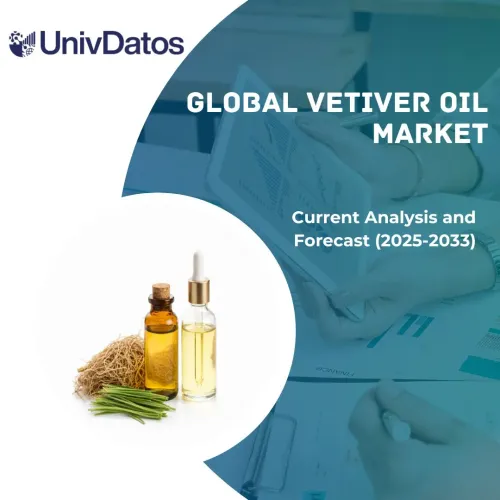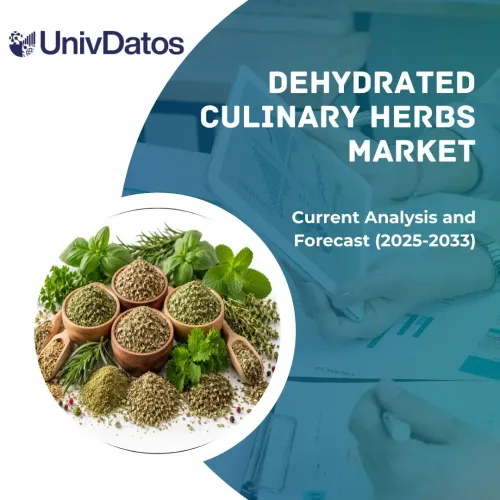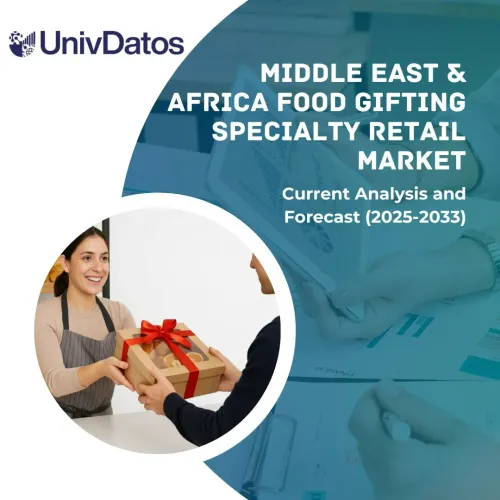- Home
- About Us
- Industry
- Services
- Reading
- Contact Us
Vegan Foods Market: Current Analysis and Forecast (2025-2033)
Emphasis on Product Type (Dairy Alternative, Meat Substitute, and Others), Source (Almond, Soy, Oats, Wheat, and Others); Distribution Channel (Offline, Online); and Region/Country
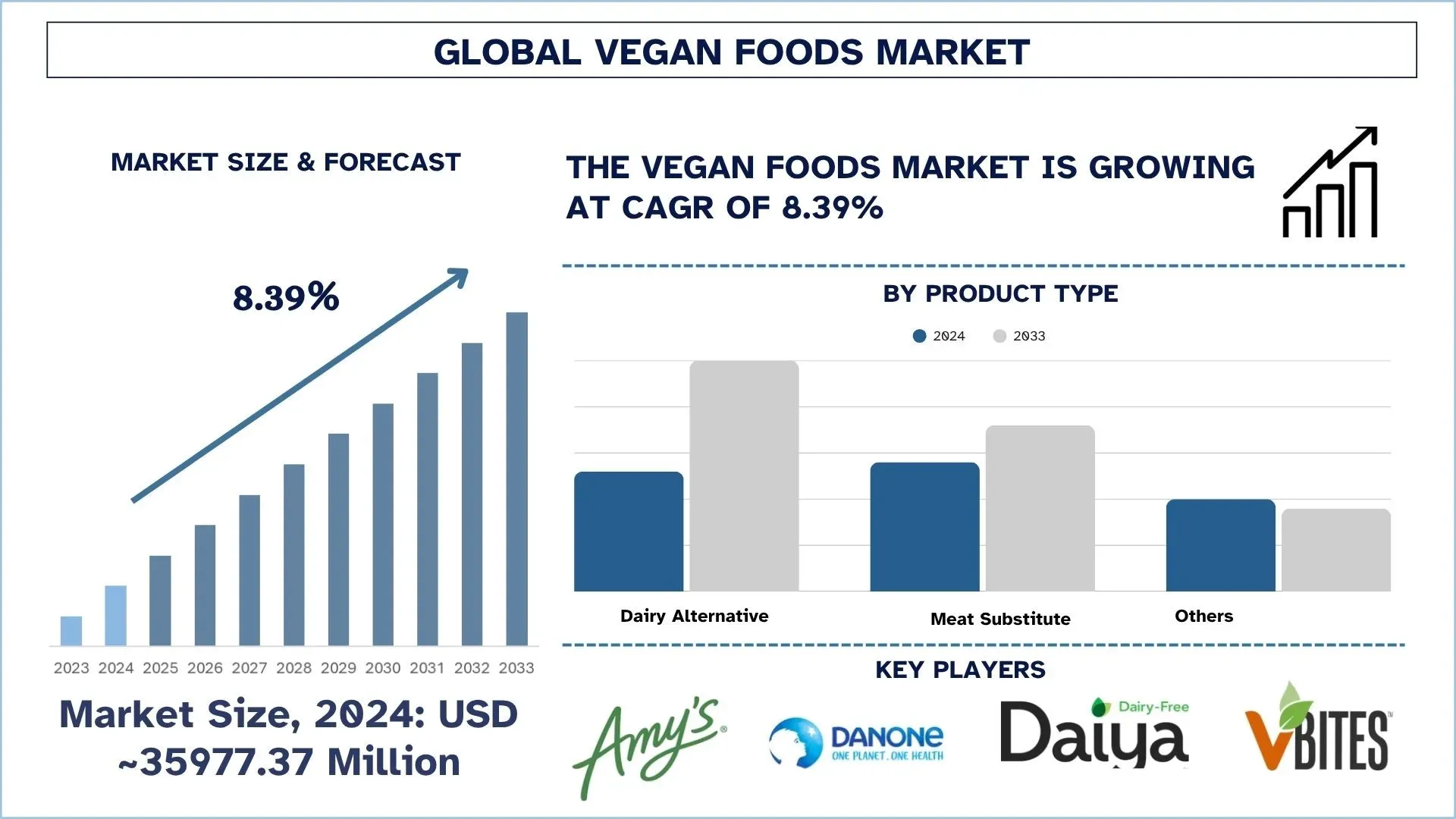
Global Vegan Foods Market Size & Forecast
The global vegan foods market was valued at USD 35977.37 Million in 2024 and is expected to grow to a strong CAGR of around 8.39% during the forecast period (2025-2033F), owing to the growing consciousness of consumers about the health benefits, environmental sustainability issues, and animal welfare issues.
The global vegan foods market is experiencing dynamic growth with the Growing trend of veganism, an increase in chronic diseases, and rising awareness about animal cruelty. In addition, there has been a notable interest in plant-based diets. The recent emphasis on clean-label products has influenced consumers in their growing interest in knowing what they are consuming. Organizations are implementing different strategies to reap the maximum benefit from the increasing demand for vegan Foods among consumers. They are persistently making investments in research and development, innovations, etc. Its major example can be seen from the expansion of Impossible Foods. On June 12, 2025, Impossible Foods declared plans to expand the relationship, potentially with new chicken items, including chicken tenders and hot dogs, with the aim of attracting flexitarians, broadening its consumer base. Further, on March 6, 2024, the recent joint venture between Oscar Mayer parent Kraft Heinz and The NotCompany, a Chile-based food-tech company backed by Amazon founder Jeff Bezos, announced the launch of a plant-based hot dog.
Global Vegan Foods Market Trends
This section discusses the key market trends that are influencing the various segments of the global vegan foods market, as found by our team of research experts.
Evolving consumer trends
The vegan food industry is advancing rapidly due to a shift in consumer behavior, which has recently focused on ethical issues, health, and environmental sustainability. Many health-minded people are adopting plant-based diets that limit chronic diseases such as heart disease, diabetes, and obesity. For example, consumer behavior and trends in the vegan food market are evident in the growth of plant-based products such as oat milk, due to their health and environmental benefits. Environmental sustainability, reducing an individual’s carbon footprint, is also a factor in the vegan food market as people try to find plant-based alternatives instead of meat and dairy products.
Vegan Foods Industry Segmentation
This section provides an analysis of the key trends in each segment of the global vegan foods market report, along with forecasts at the global, regional, and country levels for 2025-2033.
Dairy Alternative product dominates the Vegan Foods Market.
Based on product type, the market is segmented into dairy alternative, meat substitute, and others, with the dairy alternative vegan foods segment dominating in 2024. The vegan dairy alternatives market is rapidly diversifying beyond milk substitutes, spanning plant-based milks (oat, almond, soy, pea), yogurts, cheeses, butters, creamers, and ice creams. Further, companies are doing innovation and expanding to new bases like pistachio, macadamia, cashew, walnut, sunflower, and peas, which are often marketed for clean‑label transparency, higher protein, functional fortification, and unique flavor profiles. Further meat substitutes are rubbery in taste and are made from jackfruit, banana peels, etc. Other categories include the alternatives of eggs, honey, seafood, etc. Companies are doing cutting-edge development by adopting precision fermentation and cellular agriculture. Hence, continued expansion in premium flavor variants, fortified functional offerings, upscale plant-based cheeses, global M&A consolidation, and a steady shift toward hybrid and bio‑engineered are anticipated to increase the growth of dairy alternative vegan foods.
The Almond product segment dominates the Vegan Foods Market.
Based on the source, the market is segmented into almond, soy, oats, wheat, and others. Almond vegan foods held a significant share in the vegan foods industry in the year 2024. Almonds appeal to the widespread lactose intolerance, growing vegan and flexitarian demographics, and the perception of healthier, low-calorie, cholesterol-free nutrition enhanced by vitamin E and omega-rich fortification. As almonds are easily available worldwide, companies prefer to use them as raw ingredients, which is further accompanied by the consumers’ willingness to pay any price for their health. Other sources include soy, oats, wheat, peas, coconut, flax seeds, chia seeds, etc. Further product innovations, organic, non-GMO variants, fortified versions with calcium, vitamins, and proteins, are anticipated to grow this almond Vegan food market.
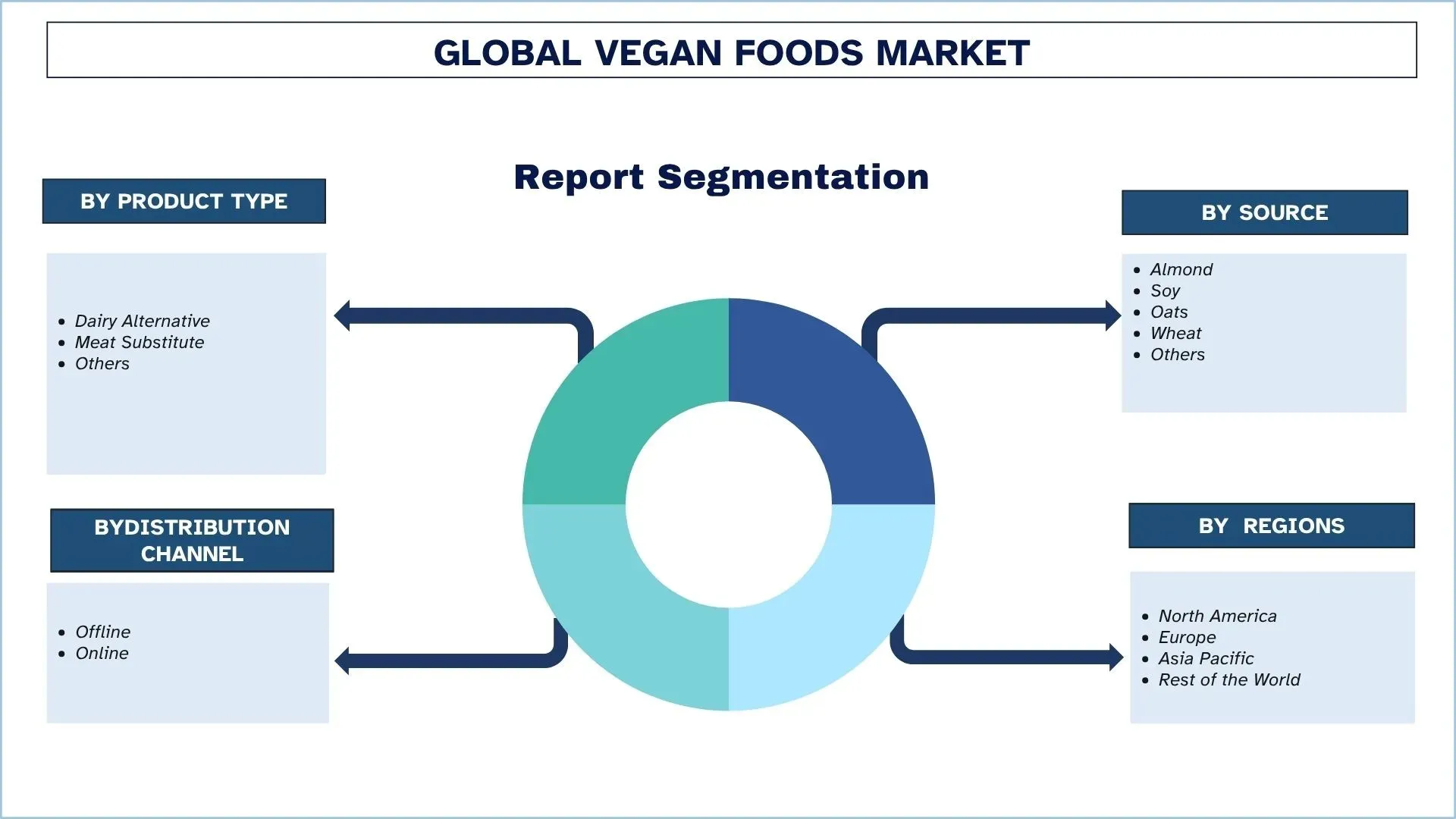
North America held a considerable share during the forecast period.
North America is a prominent region for the vegan food market, being a major contributor in 2024. North America includes developed countries, such as the United States, Canada, which are some of the leaders, due to an increased number of consumers interested in sustainability, animal welfare, and their overall well-being. This growth of awareness is driving the consumption of plant-based products in all product categories, predominantly meat, cheese, and snacks. Businesses in this area are employing new strategies for the changing consumer preferences and are innovating with technological advancements. For example, on June 10, 2025, Impossible Foods decided to move towards flexitarian consumers who consume meat infrequently by expanding the number of products by bringing on items such as chicken tenders and hot dogs. In addition, the market is further influenced by other factors, such as the growing popularity of vegan fast-food chains. On January 11, 2024, Plant-based burger chain Next Level Burger purchased vegan restaurant group Veggie Grill from VegInvest, an investment fund that had rescued Veggie Grill from almost bankruptcy the previous year. VegInvest will now become a shareholder and partner with Next Level Burger. Hence, companies are becoming active members in the vegan foods industry by catering to the consumers’ demand through new product launches, as done by Impossible Foods further followed by investments in the plant-based vegan restaurant Veggie Grill.
The U.S. held a dominant share of the North American Vegan Foods market in 2024
The vegan food market in the United States is growing rapidly due to the encouragement of consumers to adopt plant-based eating patterns to lessen the risk of heart disease, diabetes, obesity, and other chronic conditions. Additionally, Gen Z and millennials are becoming more conscious of the environmental concerns relating to animal agriculture, including greenhouse gas emissions, land and water use, and these concerns have transparently begun to affect their consumption patterns. Furthermore, emerging food technologies are providing plant-based convenience and products that mimic the taste and texture of animal-derived food products, creating demand from wider audiences. Companies are opting for various strategies to foster growth in the online distribution channel of vegan foods, with an increase in options and availability. To track and respond to changing consumer preferences, these vegan food companies are also using the applications of AI-driven data analytics. For example, Sweetgreen, a healthy food chain based in Los Angeles, on January 10, 2025, announced its expansion across the USA, and at least 40 new locations in 2025. For example, on January 5, 2022, Chipotle Mexican Grill announced investments in sustainable food-focused startups, such as Plantible, which is a plant-based protein company. Hence, companies are trying to take maximum advantage by adopting various strategic moves of the growing vegan food trends. As seen in the above case of Sweetgreen, which announced its expansion across the USA. This market is further catalyzed by the investments of Chipotle in the plant-based startup companies such as Plantible.
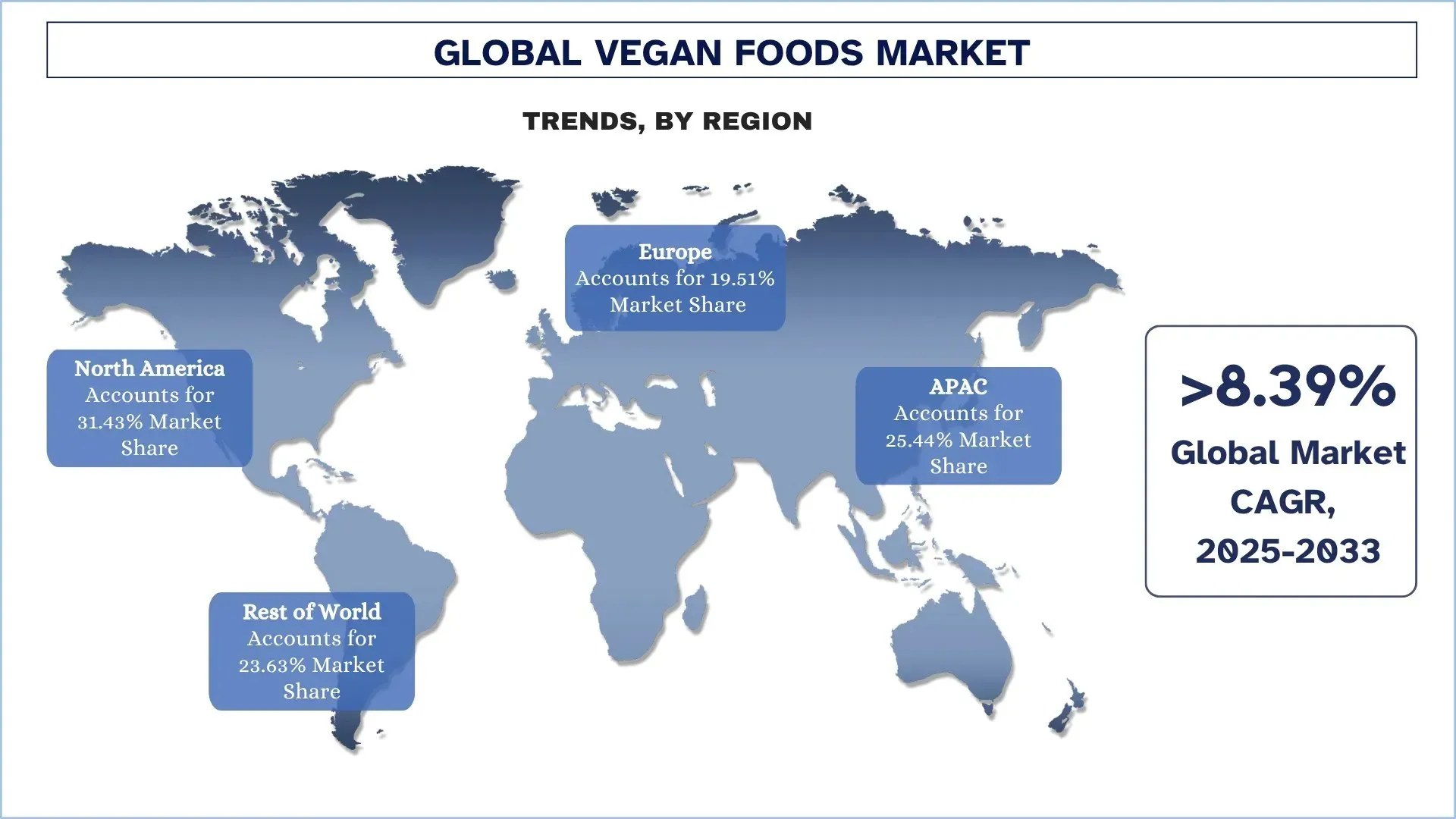
Vegan Foods Industry Competitive Landscape
The global Vegan Foods market is competitive, with several global and international market players. The key players are adopting different growth strategies to enhance their market presence, such as partnerships, agreements, collaborations, new product launches, geographical expansions, and mergers and acquisitions.
Top Vegan Foods Companies
Some of the major players in the market are Amy's Kitchen, Danone S.A., Daiya Foods Inc., Beyond Meat, Tofutti Brands Inc., Plamil Foods Ltd, VBites Foods Limited, Eden Foods Inc., VITASOY International Holdings Limited, and SunOpta Inc.
Recent Developments in the Vegan Foods Market
On Aug 25, 2023, The Urgent Company, known for its plant-based ice cream brand Brave Robot, was acquired by Superlatus. The acquisition aimed to expand Brave Robot’s product line and distribution, including plans to launch a line of pulse protein snacks in 2024.
On August 1, 2023, New York-based LIVEKINDLY Collective (LKC) expanded its plant-based portfolio with the acquisition of Glendale, California-based Alpha Foods.
On March 06, 2023, Singapore-based food tech company Next Gen Foods, known for its plant-based chicken brand TiNDLE, acquired Mwah, a startup producing creamy plant-based dairy products. The acquisition marked Next Gen’s first foray into the plant-based dairy sector.
Global Vegan Foods Market Report Coverage
Details | |
Base year | 2024 |
Forecast period | 2025-2033 |
Growth momentum | Accelerate at a CAGR of 8.39% |
Market size 2024 | USD 35977.37 Million |
Regional analysis | North America, Europe, APAC, Rest of the World |
Major contributing region | North America is expected to dominate the market during the forecast period. |
Key countries covered | U.S., Canada, Germany, France, U.K., Italy, Netherlands, China, Japan, India, and South Korea |
Companies profiled | Amy's Kitchen, Danone S.A., Daiya Foods Inc., Beyond Meat, Tofutti Brands Inc., Plamil Foods Ltd, VBites Foods Limited, Eden Foods Inc., VITASOY International Holdings Limited, and SunOpta Inc. |
Report Scope | Market Trends, Drivers, and Restraints; Revenue Estimation and Forecast; Segmentation Analysis; Demand and Supply Side Analysis; Competitive Landscape; Company Profiling |
Segments Covered | By Product Type, By Source, By Distribution Channel, By Region/Country |
Reasons to Buy the Vegan Foods Market Report:
The study includes market sizing and forecasting analysis confirmed by authenticated key industry experts.
The report briefly reviews overall industry performance at a glance.
The report covers an in-depth analysis of prominent industry peers, primarily focusing on key business financials, type portfolios, expansion strategies, and recent developments.
Detailed examination of drivers, restraints, key trends, and opportunities prevailing in the industry.
The study comprehensively covers the market across different segments.
Deep dive regional-level analysis of the industry.
Customization Options:
The global Vegan Foods Market can further be customized as per the requirements or any other market segment. Besides this, UnivDatos understands that you may have your own business needs; hence, feel free to contact us to get a report that completely suits your requirements.
Table of Content
Research Methodology for the Global Vegan Foods Market Analysis (2025-2033)
We analyzed the historical market, estimated the current market, and forecasted the future market of the global vegan foods market to assess its application in major regions worldwide. We conducted exhaustive secondary research to gather historical market data and estimate the current market size. To validate these insights, we carefully reviewed numerous findings and assumptions. Additionally, we conducted in-depth primary interviews with industry experts across the vegan foods value chain. After validating market figures through these interviews, we used both top-down and bottom-up approaches to forecast the overall market size. We then employed market breakdown and data triangulation methods to estimate and analyze the market size of industry segments and sub-segments.
Market Engineering
We employed the data triangulation technique to finalize the overall market estimation and derive precise statistical numbers for each segment and sub-segment of the global vegan foods market. We split the data into several segments and sub-segments by analyzing various parameters and trends, including product type, source, distribution channel, and regions within the global vegan foods market.
The Main Objective of the Global Vegan Foods Market Study
The study identifies current and future trends in the global vegan foods market, providing strategic insights for investors. It highlights regional market attractiveness, enabling industry participants to tap into untapped markets and gain a first-mover advantage. Other quantitative goals of the studies include:
Market Size Analysis: Assess the current forecast and market size of the global vegan foods market and its segments in terms of value (USD).
Vegan Foods Market Segmentation: Segments in the study include areas of product type, source, distribution channel, and regions.
Regulatory Framework & Value Chain Analysis: Examine the regulatory framework, value chain, customer behavior, and competitive landscape of the vegan foods industry.
Regional Analysis: Conduct a detailed regional analysis for key areas such as Asia Pacific, Europe, North America, and the Rest of the World.
Company Profiles & Growth Strategies: Company profiles of the vegan foods market and the growth strategies adopted by the market players to sustain in the fast-growing market.
Frequently Asked Questions FAQs
Q1: What is the global Vegan Foods market’s current market size and growth potential?
The global Vegan Foods market was valued at USD 35977.37 Million in 2024 and is expected to grow at a CAGR of 8.39% during the forecast period (2025-2033).
Q2: Which segment has the largest share of the global Vegan Foods market by Product Type?
The vegan dairy alternatives market is rapidly diversifying beyond milk substitutes, spanning plant-based milk (oat, almond, soy, pea), yogurts, cheeses, butters, creamers, and ice creams. Further, companies are doing innovation and expanding to new bases like pistachio, cashew, walnut, sunflower, and peas, which are often marketed for clean label transparency, higher protein, functional fortification, and unique flavor profiles.
Q3: What are the driving factors for the growth of the global Vegan Foods market?
The Growing trend of veganism, the increase in chronic diseases, and rising awareness about animal cruelty globally are some of the factors driving the global Vegan Foods market.
Q4: What are the emerging technologies and trends in the global Vegan Foods market?
Evolving consumer trends and emerging food technologies are the emerging trends shaping the industry’s future.
Q5: What are the key challenges in the global Vegan Foods market?
Intense competition and High production costs are some of the key challenges faced by the Vegan Foods market.
Q6: Which region dominates the global Vegan Foods market?
North America leads the Vegan Foods industry, attributed to the presence of major food giants and a higher standard of living.
Q7: Who are the key players in the global Vegan Foods market?
Some of the leading Vegan Foods companies include:
• Amy's Kitchen
• Danone S.A.
• Daiya Foods Inc.
• Beyond Meat
• Tofutti Brands Inc.
• Plamil Foods Ltd
• VBites Foods Limited
• Eden Foods Inc.
• VITASOY International Holdings Limited
• SunOpta Inc.
Q8: What are the investment opportunities in the Vegan Foods market?
The vegan foods market offers strong investment opportunities in plant-based meat and dairy alternatives, ready-to-eat vegan meals, and innovative food technologies like fermentation and lab-grown products.
Q9: How are regulations affecting the Vegan Foods market?
Regulations are increasingly shaping the vegan foods market, with countries like France, South Africa, Turkey, and India tightening labeling rules banning meat, dairy, and cheese terms on plant-based products to prevent consumer confusion and protect traditional industries.
Related Reports
Customers who bought this item also bought






